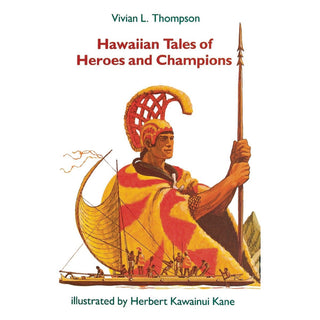Once in Old Hawaiʻi, in the days when anything was possible, supernatural kupua roamed the islands, challenging kings and chiefs, tricking men, women, and boys. The Hawaiian people would tell and retell tales of kupua exploits, and of the men who challenged them.
Some of the tall tales included in this volume are of shape-shifters like Shark Man of Ewa, who could change from man to shark, from shark to rat, from rat to a bunch of bananas. Others are of kupua with extraordinary powers like Kana, who could stretch himself as tall as a palm tree, as slender as a bamboo, as thin as a morning glory vine, as fine as a spider web. And there are men with rare and special weapons, such as Ka-ui-lani, whose talking spear could pick the winner of a cock fight before the birds were even in the ring.
As in all tales told by word of mouth, change and exaggeration crept in, and perhaps this is how the kupua tale developed – through exaggeration. That they have survived, and continue to entertain, in present-day written form, is an indication of their universal appeal.
_____
Author Vivian L. Thompson, a long-time resident of Hawaiʻi, heard her first Hawaiian legend from a guide on a mule-back trip during a visit to the Big Island of Hawaiʻi. This sparked her interest and soon after she began collecting and retelling Hawaii's many tales and legends, hoping to preserve a rapidly disappearing heritage of folklore. Her many years of research in the subject have led to the publication of five books of Hawaiian myths, legends, and tales beautifully retold for today's readers; picture storybooks for young children; and plays for children's theater.
lllustrated by Herbert Kawainui Kane
_____
paperback | 128 pages | 6" x 9" | B&W
Once in Old Hawaiʻi, in the days when anything was possible, supernatural kupua roamed the islands, challenging kings and chiefs, tricking men, women, and boys. The Hawaiian people would tell and retell tales of kupua exploits, and of the men who challenged them.
Some of the tall tales included in this volume are of shape-shifters like Shark Man of Ewa, who could change from man to shark, from shark to rat, from rat to a bunch of bananas. Others are of kupua with extraordinary powers like Kana, who could stretch himself as tall as a palm tree, as slender as a bamboo, as thin as a morning glory vine, as fine as a spider web. And there are men with rare and special weapons, such as Ka-ui-lani, whose talking spear could pick the winner of a cock fight before the birds were even in the ring.
As in all tales told by word of mouth, change and exaggeration crept in, and perhaps this is how the kupua tale developed – through exaggeration. That they have survived, and continue to entertain, in present-day written form, is an indication of their universal appeal.
_____
Author Vivian L. Thompson, a long-time resident of Hawaiʻi, heard her first Hawaiian legend from a guide on a mule-back trip during a visit to the Big Island of Hawaiʻi. This sparked her interest and soon after she began collecting and retelling Hawaii's many tales and legends, hoping to preserve a rapidly disappearing heritage of folklore. Her many years of research in the subject have led to the publication of five books of Hawaiian myths, legends, and tales beautifully retold for today's readers; picture storybooks for young children; and plays for children's theater.
lllustrated by Herbert Kawainui Kane
_____
paperback | 128 pages | 6" x 9" | B&W

